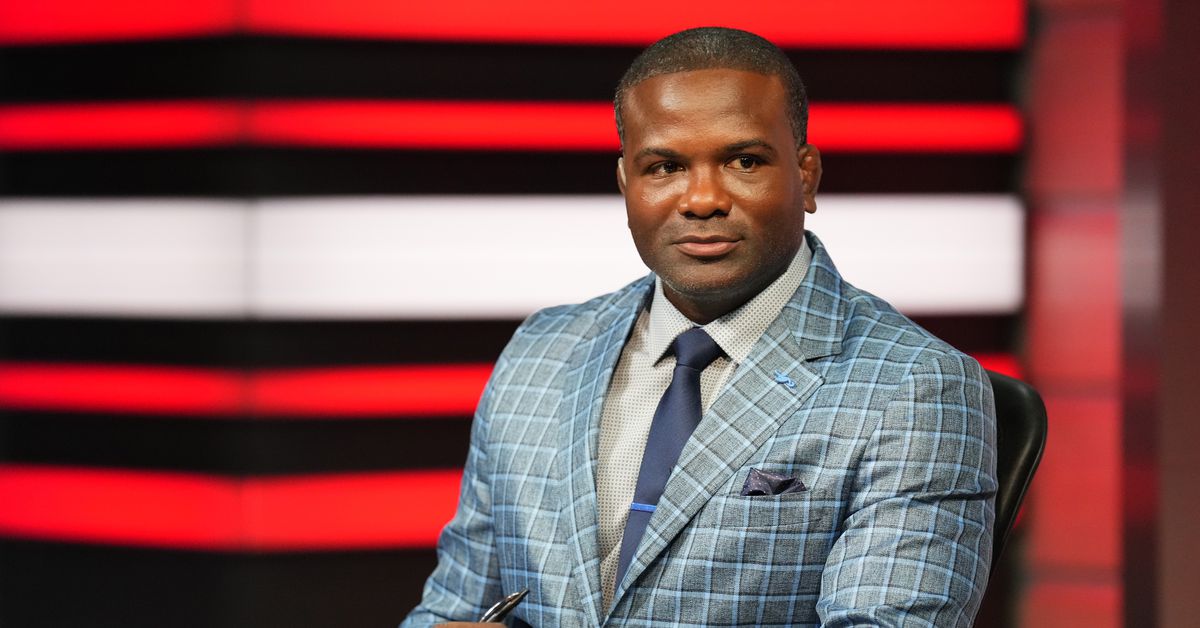Din Thomas has taken some heat for his analysis prior to Leon Edwards’ crowning moment at UFC 278, and he stands by his words.
Thomas served as a fourth voice during the main event between Edwards and Kamaru Usman at this past Saturday’s card in Salt Lake City, where Edwards landed a shocking last-minute head-kick KO to win the title in the fifth round. During the final round of a fight that saw Usman up 39-37 on all three judges’ scorecards, the booth went to Thomas to give his thoughts on what was happening with the now-welterweight champion.
“If it wasn’t obvious enough, Leon is broken now,” Thomas said on the broadcast. “And the biggest tell that you can always know this is because he doesn’t give his coach eye contact in the corner. When you don’t give him eye contact, you’re ashamed, and he’s embarrassed right now of his own performance.”
During an interview Wednesday with MMA Fighting, Thomas was asked about his comments, and in his eyes, he wasn’t wrong saying what he said.
“First off, hindsight is 20-20, right? So it’s easy to go back and go, ‘Look, he was wrong,’” Thomas told MMA Fighting. “We also live in a culture where idiots try to be smarter than everybody else. So, obviously they’re like, ‘Oh, that didn’t age well, blah blah blah,’ but in the moment when he came back to his corner? And let’s add some context to this: So he wins the first round. He had a first round against Kamaru Usman that no one has had. No one has ever had a dominating round like that against Usman.
“Then what does Usman do? Usman smiles back to the corner and goes, ‘OK, we’ve got a fight here,’ then comes back and wins the next two rounds convincingly, and easily. The fact that Leon had that first round, then gets beat the next few rounds — and it progressively gets worse — he’s getting frustrated, he’s like, ‘Oh man, I thought I was in this fight; now I’m no longer in this fight.’ That’s probably what’s running through his mind.”
For Thomas, his thoughts were based on nearly 30 years in the MMA space — as a pro fighter from 1998-2013, both in and out of the UFC — and two-decades plus of coaching experience.
The body language that Edwards was expressing between the fourth and final rounds was something Thomas is very familiar with.
“I’m saying this based on me being in that situation before, in terms of as a fighter, me being a coach for the last 25 years and dealing with fighters for the last 25 years, this is the type of mindset that they have,” Thomas continued. “They start to break. Going into that last round, as soon as [the fourth] was over, the first thing Leon did was put his arms up and his head down. Now, when you’re proud, do you put your head down? No. When you’re ashamed, you put your head down, because you don’t want to face what’s in front of you.
“When he sits down, his coach says, ‘Stop feeling sorry for yourself. What’s wrong with you?’ Those are signs — and they know him better than I do — that things aren’t going right with their fighter. I’ve been there before with my fighters, and he won’t look me in the eye because he let me down. That’s the response that Edwards gave his corner before that fifth round. His corner said what they said, put him back in maybe a slightly better spot — but let’s face it, he wasn’t fully back in it, he didn’t jump off that stool and go, ‘OK guys, I got this,’ then rally back and show signs of life.
“He plodded forward, he took one breath at a time, saw his opportunity — and Leon Edwards is a great fighter, he’s got better skills than Kamaru Usman, I’ve always said that he’s a great fighter, and he’s still capable of winning fights as a dejected man. That’s exactly what he did. He went out there, not 100-percent confident in himself — and he admitted to that, not having the performance that he wanted — his corner told him, ‘What’s wrong with you?’ That is not a sign in a confident man. That’s a sign of a man that’s, ‘I’m not done yet, but I don’t know what I got. Let’s stick this out and see what I can do.’ He was still good enough, he was still capable enough winning fights that way. And that’s what he did.”
Thomas says that the backlash he received from fans was nothing new — in fact, it happens a lot more than people think. The role of the analyst is to try and provide context to what is happening in a fight from a person who has been there before.
Edwards’ KO will not only go down as an all-time moment in the history of the UFC, but it’s Thomas’ belief that it was a career-altering and life-changing moment that compares to the Jorge Masvivdal flying knee against Ben Askren, or Nate Diaz’s submission of Conor McGregor in their first meeting at UFC 196.
What created the iconic highlight wasn’t just the kick from Edwards, but what had happened in the four previous rounds against Usman.
“Why was it a memorable moment? Because everyone thought he was out [of the fight]. It’s not memorable because everyone thought he was in it and everyone thought he could do it. It’s one of the greatest moments, one of the greatest knockouts in history, because no one thought he could do it,” Thomas explained. “That’s why it was great. It’s not because, ‘OK guys, Leon’s still got this because he lost three rounds to the pound-for-pound best fighter in the world who has never been knocked out before, but he’s capable of doing it, watch this.’ Then it wouldn’t be a great moment. It’s a great moment because no one thought it would happen.
“But because it did happen, and because the so-called experts said that he was broken, everyone wants to come out and say, ‘Oh, I’m smarter than you. I told you so.’
“And when I go back to my quote, it [starts with], ‘Obviously,’ and I began with that intentionally because in as an analyst in my position, I don’t think it’s my job to tell you what’s obvious, because you can see it. You could see that he didn’t look like he was in the fight. That was obvious, which is why I started with, ‘Obviously, he looks broken.’ Because he looked broken, and I thought that was the part that the whole world could see. My only thing to elaborate on was, ‘Here’s why.’
“If Usman was standing six inches to the left and dipped his head, that kick wouldn’t have hit with the same impact. Or if his hand just happened to catch it a part of it, we’d be saying, ‘How great is Usman? He beat up Leon Edwards for four rounds after having a round like that.’ That’s the conversation we’d be having today. But Leon Edwards throws a perfect kick, knocks out Usman, and now we’re having a conversation on why I shouldn’t have a job with the UFC.”
Between Thomas’ analysis, and play-by-play voice Jon Anik’s words right before the knockout, the ending was made even more incredible in a lot of eyes.
While Joe Rogan gave his thoughts on how the fight was playing out, and Daniel Cormier was talking about it being a potential moral victory for Edwards to go the distance, Anik said that the moral victory narrative was “not the cloth from which he is cut.” Then, the head kick landed — and the call from Anik has been celebrated ever since.
But it also created an unfair narrative in regards to the commentary that Thomas believes doesn’t exist, but in a weird way, it somehow has added to the incredible story of Edwards becoming world champion.
“I think people attach themselves to these kind of fantasies, these narratives like it was written and played out,” Thomas said. “[People were saying] me, Joe, and ‘DC’ were against Leon, and Jon Anik was for Leon, and we kind of created this whole fantasy world to make the story better — and it is better. ‘Oh, the commentary was against him. They were riding Kamaru Usman’s nuts,’ I mean, that’s the storyline. ‘But Jon Anik was the only one for him.’
“Jon called me and he was like, ‘I just happened to say that at the right time,’ and he said, ‘Eventually, Leon was going to have to answer the question why he fought the way he did for those three rounds.’ That’s kind of lost in the whole story. The one thing from the story that should be told is that he came back, not that the fact that we said he was done and he wasn’t.”


